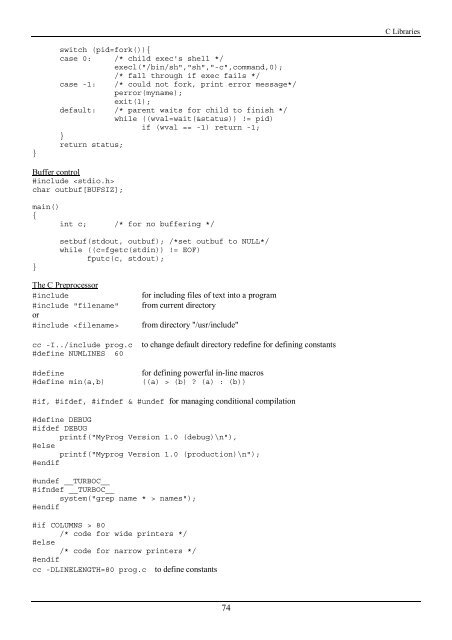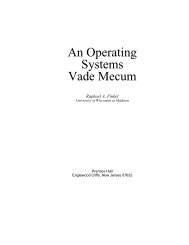Create successful ePaper yourself
Turn your PDF publications into a flip-book with our unique Google optimized e-Paper software.
C Libraries<br />
}<br />
switch (pid=fork()){<br />
case 0: /* child exec's shell */<br />
execl("/bin/sh","sh","-c",command,0);<br />
/* fall through if exec fails */<br />
case -1:<br />
/* could not fork, print error message*/<br />
perror(myname);<br />
exit(1);<br />
default: /* parent waits for child to finish */<br />
while ((wval=wait(&status)) != pid)<br />
if (wval == -1) return -1;<br />
}<br />
return status;<br />
Buffer control<br />
#include <br />
char outbuf[BUFSIZ];<br />
main()<br />
{<br />
int c; /* for no buffering */<br />
}<br />
setbuf(stdout, outbuf); /*set outbuf to NULL*/<br />
while ((c=fgetc(stdin)) != EOF)<br />
fputc(c, stdout);<br />
The C Preprocessor<br />
#include<br />
#include "filename"<br />
or<br />
#include <br />
for including files of text into a program<br />
from current directory<br />
from directory "/usr/include"<br />
cc -I../include prog.c to change default directory redefine for defining constants<br />
#define NUMLINES 60<br />
#define<br />
#define min(a,b)<br />
for defining powerful in-line macros<br />
((a) > (b) ? (a) : (b))<br />
#if, #ifdef, #ifndef & #undef for managing conditional compilation<br />
#define DEBUG<br />
#ifdef DEBUG<br />
printf("MyProg Version 1.0 (debug)\n"),<br />
#else<br />
printf("Myprog Version 1.0 (production)\n");<br />
#endif<br />
#undef __TURBOC__<br />
#ifndef __TURBOC__<br />
system("grep name * > names");<br />
#endif<br />
#if COLUMNS > 80<br />
/* code for wide printers */<br />
#else<br />
/* code for narrow printers */<br />
#endif<br />
cc -DLINELENGTH=80 prog.c to define constants<br />
74
















